- National Council of Provinces
-
National Council of Provinces 25th Parliament / 4th Democratic Parliament 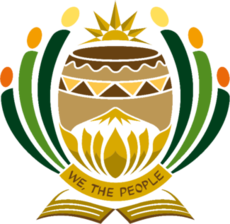
Type Type Upper house of Parliament of South Africa Leadership Chairperson M. J. Mahlangu, ANC
since 2004Leader of the Opposition Watty Watson, DA Structure Members 90 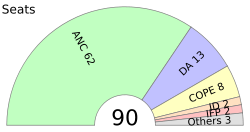
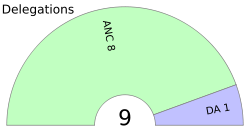
Elections Voting system Indirect proportional representation from provincial legislatures Last election 6 May 2009 Meeting place 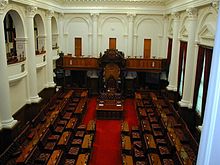
NCOP Chamber, Houses of Parliament, Cape Town, Western Cape, South Africa Website National Council of Provinces The National Council of Provinces (NCOP) is the upper house of the Parliament of South Africa under the (post-apartheid) constitution which came into full effect in 1997. It replaced the former Senate, but is very similar to that body, and to many other upper houses of legislatures throughout the world, in that its purpose is to represent the governments of the provinces, rather than directly representing the people.[1]
Contents
Composition
South Africa 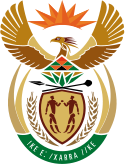
This article is part of the series:
Politics and government of
South Africa- Parliament
- National Council of Provinces
- Chairperson
- National Assembly
- Speaker
- Leader of the Opposition
- Helen Zille (national)
- Lindiwe Mazibuko (parliament)
- National Council of Provinces
- Chief Justice
- Pres. of Supreme Court of Appeal
- Lex Mpati
- Courts
Other- Political parties
- Foreign relations
- Taxation
Election to the NCOP is indirect: citizens vote for provincial legislatures, and each legislature then nominates a delegation of ten members to the NCOP. (Thus, each of South Africa's nine provinces has equal representation in the Council regardless of population.) Each provincial delegation consists of six permanent delegates, who are nominated for a term that lasts until a new provincial legislature is elected, and four special delegates.[2] One of the special delegates is the province's Premier, or another member of the provincial legislature designated by the Premier, while the other three special delegates are designated ad hoc by the provincial legislature. The party representation in the delegation must proportionally reflect the party representation in the provincial legislature, according to a formula included in the Constitution.[2] A delegation from the South African Local Government Association (SALGA), which represents the municipalities, may also attend sittings of the NCOP, but may not vote.
After the elections of 22 April 2009, the makeup of the NCOP was as follows:
Determination of delegates to the National Council of Provinces after the 22 April 2009 provincial elections Party Delegate type EC FS G KZN L M NW NC WC Total African National Congress Permanent 4 4 4 4 5 5 4 3 2 35 62 Special 3 3 3 3 4 4 3 3 1 27 Democratic Alliance Permanent 1 1 1 1 1 1 1 3 10 13 Special 1 2 3 Congress of the People Permanent 1 1 1 1 1 1 1 7 8 Special 1 1 Independent Democrats Permanent 1 1 2 Special 1 1 Inkatha Freedom Party Permanent 1 1 2 Special 1 1 Freedom Front Plus Special 1 1 United Christian Democratic Party Special 1 1 United Democratic Movement Special 1 1 Total 10 10 10 10 10 10 10 10 10 90 Decisions
The NCOP may consider, amend, propose amendments to, or reject legislation. It must consider all national bills, and also has the power to initiate legislation in the functional areas where Parliament and the provincial legislatures have concurrent legislative power ("Schedule 4 areas").[1]
The NCOP has three decision-making mechanisms depending on the type of bill:[3]
- "Section 74 bills" amend the Constitution; they may not deal with any matters other than constitutional amendments and matters related to the amendments. A bill that amends section 1 of the constitution (which defines South Africa as a constitutional democratic republic), or amends the Bill of Rights, or amends any constitutional provision affecting the NCOP itself, provincial boundaries or powers, or other specifically provincial matters, must be passed by the NCOP. Each delegation has one vote, and six of the nine delegations must approve the bill for it to pass. Other constitutional amendments do not have to be passed by the NCOP, but they must be debated publicly in the NCOP.
- "Section 76 bills" fall into any of the Schedule 4 areas, as well as various other laws specifically envisaged in the Constitution. In handling Section 76 bills, each delegation has one vote, and five of the nine delegations must approve the bill for it to pass.
- All other bills, specifically including money bills, are "Section 75 bills". In handling Section 75 bills, each delegate in the NCOP has a vote, and the bill must be approved by a majority of members present for it to pass.
In considering Section 74 and 76 bills, each delegation must vote in accordance with a mandate approved by the provincial legislature that it represents.[4]
Chairpersons
The following people have served as Chairperson of the NCOP:[5]
Name Term Party Patrick Lekota 6 February 1997–21 June 1999 ANC Naledi Pandor 21 June 1999–4 May 2004 ANC Joyce Kgoali 4 May 2004–21 November 2004 ANC M. J. Mahlangu 21 November 2004–present (acting to 17 January 2005) ANC References
- ^ a b "National Council of Provinces". Parliament of South Africa. http://www.parliament.gov.za/live/content.php?Category_ID=27. Retrieved 3 December 2010.
- ^ a b Constitution of the Republic of South Africa, 1996, ss. 60–62.
- ^ Constitution of the Republic of South Africa, 1996, ss. 73–77.
- ^ Mandating Procedures of Provinces Act, 2008, No. 52 of 2008
- ^ "South African ministries, etc.". Rulers.org. http://rulers.org/safrgov.html. Retrieved 3 December 2010.
External links
See also
Parliament of South Africa National Assembly • National Council of ProvincesProvincial legislatures Eastern Cape • Free State • Gauteng • KwaZulu-Natal • Limpopo • Mpumalanga • Northern Cape • North West • Western CapeLocal and metropolitan government Johannesburg • Durban • Cape Town • Pretoria • East Rand • Port ElizabethCategories:- South Africa stubs
- 1997 establishments
- Government of South Africa
- National upper houses
- Parliament of South Africa
- Parliament
Wikimedia Foundation. 2010.
